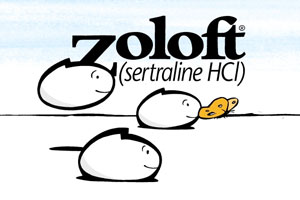Zoloft in Brief
 Zoloft is the brand name of a compound called sertraline. It is one of a class of antidepressant medications called serotonin-specific reuptake inhibitors (SSRI). The SSRIs are a relatively new group of antidepressants, the first of which was Prozac, approved for use in the United States in 1988. In the early 1990s, several researchers published articles noting that upon administration of these SSRIs, suicidal thoughts, gestures (such as self mutilation or cutting), and even attempts increased. The articles noted that for some patients, suicidal thoughts had not been reported in the past despite the diagnosis of depression, and that in others the intensity of these thoughts or actions greatly increased.
Zoloft is the brand name of a compound called sertraline. It is one of a class of antidepressant medications called serotonin-specific reuptake inhibitors (SSRI). The SSRIs are a relatively new group of antidepressants, the first of which was Prozac, approved for use in the United States in 1988. In the early 1990s, several researchers published articles noting that upon administration of these SSRIs, suicidal thoughts, gestures (such as self mutilation or cutting), and even attempts increased. The articles noted that for some patients, suicidal thoughts had not been reported in the past despite the diagnosis of depression, and that in others the intensity of these thoughts or actions greatly increased.
Can Zoloft Cause Suicidal Thinking?
Is Zoloft to blame for these thoughts? Can any medication cause suicidal thinking or actions? Some family members who have lost their loved ones to suicide after taking Zoloft say yes. Some lawyers say yes. Entire websites have cropped up, devoted to explaining the links, publishing the research, and informing the public. But how could this be? What could the medication be doing that would cause someone who was not suicidal to become so?
While the manufacturers of sertaline insist that this medication does not cause suicidal thinking or behaviors, over 200 lawsuits have been filed against the drug companies. In 2004, the FDA issued a warning regarding sertraline and all other SSRIs (including the very commonly prescribed Prozac) indicating that an increase in suicidal thoughts has been linked to use of these medication.
But does a correlation mean there is causation? One possible explanation for how an antidepressant could cause suicide has to do with the symptoms of depression. A deep depression may involve severe fatigue, exhaustion, and a sense of being completely unable to do anything. Some people complain that they simply cannot get out of bed at all when depression hits. As sad and low as their mood may be, that emotion is matched by a deep and pervading lethargy. For some, it has been theorized, the medication begins to improve the lethargic feeling before addressing the low mood. This means the patient has energy and can function much more fully, but still feels completely despondent. Some clinicians believe this increase in energy prior to improvement in mood may be a key component in understanding the suicides.
Others feel strongly that the changes in serotonin levels can cause irrational and severe behavior changes. While research has not yet “proved” this connection, the correlation is strong enough to require the FDA warning label.
The Other SSRI Debate
As if it weren’t concerning enough to need to worry that your antidepressant medication might lead to suicidal thoughts, a more recent controversy has arisen regarding the use of SSRIs. As early as 1991, researchers questioned the serotonin- depression link, asserting that in some people low levels of serotonin are correlated with elevated and stable positive mood (absence of depression) while in other people high serotonin levels have been correlated with depression. The lock-step correlation between low serotonin and depression that was the mainstay of explanations regarding brain chemistry and antidepressant medications has been broken.
More recent research has indicated that SSRIs may be more helpful than placebos in cases where depression is severe, but no more effective than “sugar pills” in those mild to moderate cases of depression where diagnostic criteria may be met but none of the symptoms could be rated as severe. In those cases, other modalities, such as psychotherapy and physical activities (walking and yoga are both highly recommended) are considered to be as effective as antidepressant medication.
What does Zoloft do?
Zoloft’s primary action is as an SSRI: this medication prevents the reuptake of serotonin in the brain. This means that higher serotonin levels should be in “circulation” as opposed to having been bound to receptors. It is theorized that higher levels of available serotonin leads to improved mood, but recently this assertion has been challenged. In addition to working on serotonin receptors, sertraline also has an impact on dopamine receptors, thereby increasing availability of dopamine.
What are the Most Common Side Effects?
Initially, Zoloft may cause gastrointestinal distress and headaches, but these symptoms often resolve by themselves quickly. Sexual side effects are common with SSRIs, including loss of interest, diminished libido, and inability to achieve orgasm. Weight gain is also common. Zoloft can be sedating, and drinking alcohol will increase the sedating effect.
If you are considering a trial of antidepressant medication, talk about any concerns you may have with your doctor. Ask about effectiveness, risks, and side effects and make an informed decision. Depression is not a fact of life and need not be tolerated, but you may have treatment options you have not yet considered. Enlist the help of family, friends and professionals, and you will discover that depression can be beat.



